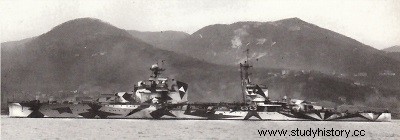
The Royal Navy did not learn until much later why Italian forces had pulled away from the bulk of their own fleeing squadron. The explanation was simple:after the English air attack at dusk, the Italians had quietly moved towards their bases until Iachino, shortly after 8 p.m., intercepted a signal from the Zara to the Pola:“Give your position. A little
later, the Zara transmitted to the flagship:"The Pola reports that she has been torpedoed astern and is paralyzed." Until then, Iachino had been unaware of the ship's fate.
Like the commanders of his cruisers, the Italian admiral was unaware that other British ships had come to reinforce Pridham's group- Wippell and were nearby. He therefore decided to send the Fiume, the Zara and the destroyers to the help of the Pola. They left, then, at 10:28 p.m., Lachino saw the flashes of the 381 mm guns, 45 miles behind him. and finally understood that the English battleships were very close. It only remained for him to hope that the Vittorio Veneto would pass unnoticed, and be able to return to her anchorage as quickly as her damage allowed.
The continuation of the battle of Matapan is a vain attempt by the English to intercept the Vittorio Veneto and the success of having sent the three cruisers already hit to the bottom, as soon as they realized that the Vittorio Veneto had disappeared. It was the work of Captain Philip Mack, commanding the 14th Destroyer Flotilla aboard the Jervis. The latter first finished with the Zara, the Fiume having already sunk - then discovered the Pola broken down on the waves. Part of his crew had jumped overboard, then, seeing that the ship was not sinking, came back on board. The men had taken off their soaked clothes. To warm up, they had started drinking; some of them were obviously drunk, others, on the other hand, seemed half intoxicated by the fumes coming from the engine room.
The Jervis came to side with the Pola and sent a group armed with cutlass. The Italians offered no resistance and the ship could have been brought back to Alexandria as a prize of war had it not been for the threat of a full-scale Luftwaffe attack the next morning. As a result, a Nubian torpedo sent it to the bottom.
Back in Italy, Lachino had to report the disaster to Mussolini. Le Duce, to the great surprise of the admiral, one suspects, received him with calm and understanding.
A little later, while studying the minutes of the radio taps of the battle, Iachino's staff noticed that the English had spotted the presence of the Italian ships long before they could see them, so they deduced that the British fleet was using the radar.
Mussolini understood finally that its fleet could only operate freely in the Mediterranean if it had aircraft carriers; he therefore gave the order to convert two large liners for this purpose. The first, the Aquila (ex-Roma), ready to begin its trials, was found damaged in Genoa; the second, the Sparviero tex-A ugustus), little advanced, was flanked by the Germans.
On the British side, we were very satisfied to have sunk three cruisers and two of the destroyers who accompanied them. Alfieri and Carducci. We deplored, on the other hand, the nocturnal leak of the Vittorio Veneto, a leak which essentially resulted from a transmission error. All in all, however, the Italian surface fleet had been so seriously affected that it was going to be utterly impossible for it to intervene effectively to prevent warships and transports from evacuating Greece and Crete. over the next two months.
